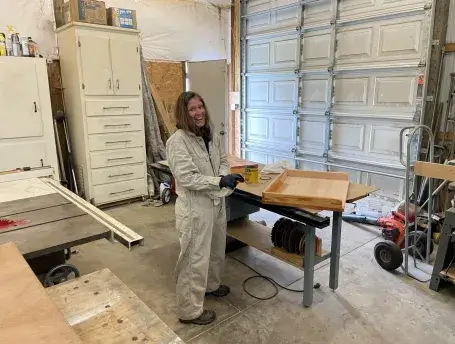Gabrielle Ellis and her partner, Steffan, pour their hearts into running a working farm in Sequim, Wash. Caring for over 40 animals – including horses, cows, pigs, and chickens – is a daily labor of love. They even welcome local families to visit and experience farm life firsthand.
But this deeply rewarding lifestyle comes with challenges. Earlier this year, Gabrielle received difficult but not unexpected news: her kidneys were failing. She has Polycystic Kidney Disease (PKD), a hereditary condition that also affects several of her relatives and ultimately leads to kidney failure.
“My grandma, my mom and my sister all had to do dialysis,” says Gabrielle. “I knew it was a matter of when, not if.”
Gabrielle comes from a long line of strong women who have lived with Polycystic Kidney Disease (PKD), a hereditary condition that causes fluid-filled cysts to grow in the kidneys, eventually leading to kidney failure. Though she was no stranger to the disease, her own dialysis journey came with unexpected challenges.
Her nephrologist recommended in-center hemodialysis at Northwest Kidney Centers’ Port Angeles clinic. Gabrielle started hemodialysis but the three-times-a-week treatments took a toll.
“It was brutal,” Gabrielle remembers. “Each session left me feeling completely drained. I’d come home and collapse. I had no energy left for anything.”
The tiredness, and the inconvenience of leaving her farm, combined with her fear of needles led her to seek other treatment options. That’s when she connected with peritoneal dialysis (PD) nurse Lara Servern, who manages Northwest Kidney Centers’ PD program for the Port Angeles region.
Gabrielle knew right away that PD would be a better fit. With the home program, Gabrielle would save significant travel time and be able to dialyze from the comfort of her home, and the more frequent PD dialysis schedule is easier on the body than in-center hemodialysis.
Lara and the home team make sure to emphasize the benefits of home dialysis to patients within the first 30 days of them being admitted at Northwest Kidney Centers. Among those benefits: There’s no limit or waitlist for home PD, unlike in-center dialysis, where there needs to be an open chair and staff available.
“Home dialysis gives me the flexibility to work around my schedule,” Gabrielle said. “It’s a lot of work, but it’s been worth it.”
Gabrielle had to convert her sewing room into a treatment space and get accustomed to the process of PD. Before patients can dialyze at home, they must complete two training courses and get approved by Lara and her team.

“Once a patient has their PD catheter placed, we guide them through hands-on training,” Lara said. “After that, they’re able to do treatments independently – but they’re never alone. We’re available 24/7 if anything comes up.”
As the only clinic in the area, Northwest Kidney Centers’ Port Angeles clinic is a lifeline for rural patients. Without it, patients would have to travel over an hour each way to Port Townsend to dialyze.
Home dialysis is also becoming more of a popular option in rural areas. Most U.S. dialysis programs have an average of 14% of patients dialyzing at home, but at the Northwest Kidney Centers Port Angeles clinic, it’s closer to 32%.
For people like Gabrielle, who live in rural areas and have full, busy lives, having options can make all the difference. Being able to dialyze at home means less time driving and more time doing what she loves: taking care of her animals and building a life on the farm.
“We’re just following our dreams,” Gabrielle said. “It’s a lot of work and a grind at times, but the flexibility of dialyzing at home really helps.”
